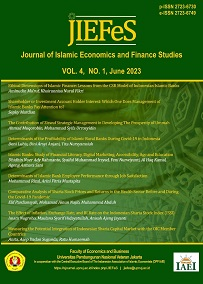The Effect of Inflation, Exchange Rate, and BI Rate on the Indonesian Sharia Stock Index
DOI:
https://doi.org/10.47700/jiefes.v4i1.5804Keywords:
BI Rate, Exchange Rate, Indonesian Sharia Stock Index, InflationAbstract
Islam strongly advises against investment, as mentioned in lines 46–49 of the Surah Yusuf. The Islamic stock market, which offers Islamic stocks as one of its components, is one place where somebody can invest. Several macroeconomic and microeconomic factors, as well as equity investment, have an impact on Islamic stocks. This study examined the impact of inflation, exchange rates, and the BI Rate on the Indonesian Sharia Stock Index (ISSI) throughout the years 2017–2021. Statistical data on the market capitalization of the Indonesian Sharia Stock Index (ISSI) given at the Financial Services Authority (OJK), as well as other variables like inflation, currency rates, and the BI, were used in the quantitative research technique. Analysis of the research data was carried out through multiple linear regression modeling. The results showed that the Inflation variable (X1) had no effect on the Indonesian Sharia Stock Index (ISSI), the Exchange Rate variable (X2) had a significant negative effect on the Indonesian Sharia Stock Index (ISSI) and the BI Rate variable (X3) had an effect significantly positive to the Indonesian Sharia Stock Index (ISSI). The macroeconomic variables used in this study have an impact on the movement of the Islamic stock index, which causes the movement of the ISSI to vary quite a bit.
References
Aliyah, Siti. (2016). The Effect of Inflation and the BI Rate on the Jakarta Islamic Index (JII) Stock Price Index (2012-2014 Period). Mini Thesis. IAIN Salatiga.
As Shadiqqy, M. (2020). The Influence of the Industrial Production Index (IPI), Bank Indonesia Sharia Certificates (SBIS), Inflation and Exchange Rates on the Indonesian Sharia Stock Index (2012-2018 period). Panangkaran: Journal of Religion and Society Research, 3 (2), 39. https://doi.org/10.14421/panangkaran.2019.0301-03
Aulia, R., & Latief, A. (2020). The Effect of Inflation and the BI Rate on the Indonesian Sharia Stock Index (ISSI). Borneo Student Research, 1 (3), 2140–2150. https://journals.umkt.ac.id/index.php/bsr/article/download/872/585
Bakri, Melati Sukma, R., Alief Fahdal Imran Oemar, M., Faculty of Economics and Business, P., & Hasanuddin, U. (2022). Strategic Planning in Increasing Investment Investment Services and One-Stop Services. Amkop Management Accounting Review (AMAR), 2(2), 1–10. https://doi.org/10.37531/amar.v2i2.147
Fajar, F., Rizali, R., & Rahmini, N. (2022). Contribution of Sharia Shares, Sukuk, Sharia Mutual Funds and Conventional Shares to National Economic Growth. Syntax Idea, 4(1), 77. https://doi.org/10.36418/syntax-idea.v4i1.1750
Fathurrahman, A., & Widiastuti, R. A. (2021). Determinants of Indonesian Sharia Stock Index. Islamic Banking: Journal of Islamic Banking Thought and Development, 7(1), 179–194. https://doi.org/10.36908/isbank.v7i1.309
Fuadi, A. (2020). Inflation and the Rupiah Exchange Rate Against the Indonesian Sharia Stock Index. Pelita Bangsa Journal of Business Accounting , 5 (01), 1–12. https://doi.org/10.37366/akubis.v5i01.102
Hayati, M. (2016). Investment According to Islamic Economic Perspective. IKONOMIKA: Journal of Islamic Economics and Business , 1 (1), 66–78. http://www.ejournal.radenintan.ac.id/index.php/ikonomika/article/view/143
Herlina, M.S.T, & Latief, A. (2020). Inflation and the Rupiah Exchange Rate Against the Indonesian Sharia Stock Index. Pelita Bangsa Journal of Business Accounting, 5 (01), 1–12. https://doi.org/10.37366/akubis.v5i01.102
Junaidi, A., Wibowo, MG, & Hasni. (2021). The Effect of Macroeconomic Variables on the Indonesian Sharia Stock Index (ISSI) for the 2014-2019 period. Autoregressive Distributed Lag, 24 (1), 17–29. https://jurnal.unikal.ac.id/index.php/jebi/article/view/1364
Kamal, M., Kasmawati, Rodi, Thamrin, H., & Iskandar. (2021). The Effect of Inflation Rates and Rupiah Exchange Rates on the Indonesian Sharia Stock Index (Issi). Journal of Tabarru': Islamic Banking and Finance, 4 (2), 521–531. https://doi.org/10.25299/jtb.2021.vol4(2).8310
Mawarni, CP, & Widiasmara, A. (2018). The Influence of the Fed Rate, World Oil Prices, Bi Rate, Inflation and Rupiah Exchange Rate on the Indonesian Sharia Stock Index (Issi) for the 2011-2017 period. Inventory: Journal of Accounting 2 (2), 281. https://doi.org/10.25273/inventory.v2i2.3288
Nur, S., & Fatwa, N. (2022). Analysis of the Effect of Macroeconomic Indicators on the Indonesian Sharia Stock Index. Journal of Tabarru': Islamic Banking and Finance, 5 (1), 122–131. https://doi.org/10.25299/jtb.2022.vol5(1).9045
Pardiansyah, E. (2017). Investment in Islamic Economic Perspective: Theoretical and Empirical Approach. Economica: Journal of Islamic Economics, 8 (2), 337–373. https://doi.org/10.21580/economica.2017.8.2.1920
Ranto, A.I. (2018). Effects of Inflation, Exchange Rates, Yields on Islamic Bank Deposits, and Commercial Bank Deposit Interest Rates, on the Indonesian Sharia Stock Index (ISSI) for the period May 2011 to December 2017. https://www.oecd.org/dac/accountable-effective-institutions /Governance
Saputra, R. (2017). The Effect of Bi Rate, Inflation, Rupiah Exchange Rate, and Bank Indonesia Sharia Certificates (Sbis) on the Indonesian Sharia Stock Index (Issi). I-Economics, 3 (1), 51–72.
Saraswati, F. (2013). Analysis of the influence of sharia bank Indonesia certificates, inflation, the rupiah exchange rate, and the money supply on the net asset value of sharia mutual funds. Journal of Economics .
Suciningtias, SA, & Khoiroh, R. (2015). Impact Analysis of Macroeconomic Variables on the Indonesian Sharia Stock Index (ISSI). Conference In Business Accounting and Management, 2 (1), 1. http://lppm-unissula.com/jurnal.unissula.ac.id/index.php/cbam/article/view/323
Syah, TA (2018). The Influence of Inflation, BI Rate, NPF, and BOPO on the Profitability of Islamic Commercial Banks in Indonesia. el-Jizya: Journal of Islamic Economics, 6 (1), 133–153. https://doi.org/10.24090/ej.v6i1.2051
Tripuspitorini, FA (2021). Analysis of the Effect of Inflation, Rupiah Exchange Rate, and BI-Rate on Indonesian Sharia Stock Index Prices. Journal of Maps (Sharia Banking Management), 4 (2), 47–56. https://doi.org/10.32483/maps.v4i2.50
Widiyanti, M., & Sari, N. (2019). Study of Islamic Capital Market in Influencing Economic Growth in Indonesia. Economist: Journal of Economics and Development Studies, 19 (1), 21–30. https://doi.org/10.30596/ekonomikawan.v19i1.3236
Zuhri, A. (2020). Effect of Inflation, Rupiah Exchange Rate, Bi Rate and Money Supply on the Indonesian Sharia Stock Index (ISSI) for the 2016-2018 period. e_Scientific Journal of Accounting Research, 9(09)
Downloads
Published
Issue
Section
License
Copyright (c) 2023 Imam Nugroho, Maulana Syarif Hidayatullah, Anisah Ajeng Jayanti

This work is licensed under a Creative Commons Attribution 4.0 International License.
Authors who publish with this journal agree to the following terms:
- Authors retain copyright and grant the journal right of first publication with the work simultaneously licensed under a Creative Commons Attribution 4.0 International License that allows others to share the work with an acknowledgment of the work's authorship and initial publication in this journal.
- Authors can enter into separate, additional contractual arrangements for the non-exclusive distribution of the journal's published version of the work (e.g., post it to an institutional repository or publish it in a book), with an acknowledgment of its initial publication in this journal.
- Authors are permitted and encouraged to post their work online (e.g., in institutional repositories or on their website) before and during the submission process, as it can lead to productive exchanges, as well as earlier and greater citation of published work.

This work is licensed under a Creative Commons Attribution 4.0 International License.











